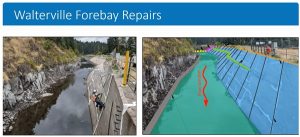Dissonant Times questions EPD use of Flock license plate readers
4 min read
Curtis Blankinship (KEPW News): From a report called ‘Let’s Leave the Flock’ by Joy Santiago on DissonantTimes.org:
In recent weeks, Eugene commuters may have noticed the installation of tall black poles outfitted with solar panels and traffic cameras. The Eugene Police Department or EPD has welcomed 57 Flock Safety cameras to Eugene with open arms thanks to a $391,264 retail theft prevention grant from the Oregon Criminal Justice Commission.
[00:00:39] Flock Safety produces long-range license plate recognition or LPR cameras that indiscriminately capture footage of vehicles as they drive past so that local police departments can identify vehicles by make, color, decals. This technology is not just limited to drivers. It can also capture digital footprints of bicycles and even animals.
[00:01:06] The data that is captured by these cameras per EPD’s contract with Flock Safety will be stored in a cloud database maintained by the company for 30 days. The company not only contracts with Eugene Springfield, but also with law enforcement agencies. And homeowners’ associations across the U.S. According to the ACLU, Flock Safety intends to expand to every city in the United States and is already embedded in more than 2,000 cities across 42 states.
[00:01:39] Flock cameras are different than other automated license plate readers currently used by law enforcement. ALPR technology traditionally takes pictures of plates, checks them against local hotlists, and then immediately deletes the data. If the plate is not associated with a report with a reported crime, Flock’s take on LPR is evangelizing AI-powered cloud-stored mass surveillance that by its very design records all of our comings and goings, every trip to the grocery store or the doctor’s office and holds onto that data in a database that any law enforcement entity can access for up to 30 days.
[00:02:21] In a time where the protection sanctuary cities such as Eugene often become increasingly tenuous, due to allowance of Immigration and Customs Enforcement (ICE) and the Department of Homeland Security (DHS) to collaborate with local law enforcement agencies and nationally, concerns mount about how women and trans folks’ bodies are increasingly policed.
[00:02:46] We cannot assume that this large-scale surveillance network will be used benevolently.
[00:02:53] While Flock Safety claims that its tools will curb violent crime by helping with Amber Alerts and preventing vehicle theft, there are already reports that Flock cameras have been used by the state to perpetuate acts of political violence and oppression.
[00:03:07] 404 Media found that ICE used Flock data from across the country in collaboration with local police departments. They also reported that a Texas sheriff’s department used the technology in an effort to locate a woman who had an abortion.
[00:03:24] Despite these real threats to privacy and freedom, EPD Chief Chris Skinner said, I’m really confident based on the way our contract is written with them that Flock is not farming out our data that we have here in Eugene somewhere else,’ in an interview with KLCC. Dissonant Times filed a public records request to see the contract.
Even if the contract is more secure than other police departments across the country, can we be confident that EPD won’t use the data to surveil political opponents, estranged wives or girlfriends or members of marginalized communities?
[00:04:03] Evidently there was little to no opportunity for public intervention or opposition before the cameras appeared all over town. EPD has not returned a request for comment on this point.
[00:04:15] Perhaps most disturbing is that the financial resources this OCJC grant provided could have gone to other vital and underfunded community resources that are known to reduce crime, such as job and housing security, health care and education.
[00:04:32] When discussing how the cameras assisted in an investigation, Chris Skinner told KLCC: We could have flooded our streets with 20, 30, 40 cops looking for this vehicle. But we didn’t. What we did was, we plugged it into the system and we let the technology do that for us. When you think about resource management and how you leverage your resources, I think being a resource multiplier is a fair and accurate representation.
[00:04:59] But what resources ought to be multiplied? Does EPD really need multiplication when over a third of the city general fund is already allocated to the department?
[00:05:08] Regardless of EPD’s techno-optimism, Flock cameras will not revive CAHOOTS, keep the library open seven days a week, put food on the table, or bring back Eugene’s only hospital, which is now a SWAT training facility.
[00:05:23] It is obvious how Flock benefits EPD, but it is less obvious how this partnership benefits the rest of us.
[00:05:31] A more militarized police, more state surveillance will not keep us safe. Safety is guaranteed through our friends, families, neighbors, health care providers, mentors, farmers, and access to clean water and natural resources. The surveillance network could never replace our networks of relation.
See a Flock camera? Send in your report to our team: editor@dissonanttimes.org.
For KEPW News, I’m Curtis Blankinship.
Dissonant Times is published under the BY-NC-SA Creative Commons license (attribution, noncommercial, share-alike).





